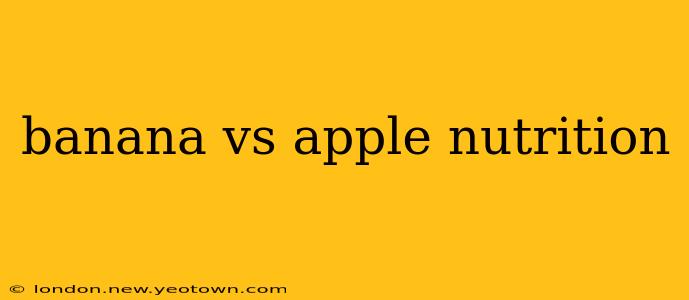Banana vs. Apple: A Nutritional Showdown!
The age-old debate: banana or apple? Both fruits are readily available, convenient snacks, and nutritional powerhouses, but which one reigns supreme? Let's dive into a head-to-head comparison, exploring the nutritional differences and helping you decide which fruit best suits your needs. This isn't about declaring a winner, but understanding the unique benefits each fruit offers.
Our journey begins in a bustling farmer's market, overflowing with vibrant colors and the sweet aroma of ripe fruits. Imagine reaching for a plump, yellow banana beside a crisp, red apple. Both beckon, promising a burst of flavor and a healthy dose of nutrients. But which one will you choose?
What are the key nutritional differences between bananas and apples?
This is a crucial question, and the answer lies in examining their macronutrient and micronutrient profiles. Bananas are richer in potassium and vitamin B6, while apples boast higher levels of vitamin C and fiber. Let's break it down:
-
Bananas: Known for their potassium content, crucial for maintaining healthy blood pressure and muscle function. They also provide a decent amount of fiber, aiding digestion. The natural sugars in bananas offer a quick energy boost, making them a popular choice for athletes.
-
Apples: Apples are champions of fiber, especially soluble fiber, which helps lower cholesterol levels. Their vitamin C content strengthens the immune system, acting as a natural antioxidant. The diverse array of phytonutrients in apples contributes to their overall health benefits.
Which fruit is better for weight loss?
Both bananas and apples can be part of a healthy weight-loss diet, but their caloric and fiber content plays a role. Apples generally have fewer calories and a higher fiber content per serving, promoting satiety and aiding in weight management. However, the portion size matters significantly. A large banana has more calories than a small apple.
Are bananas or apples better for digestion?
Both fruits are beneficial for digestion, but in different ways. Bananas are easier to digest due to their softer texture and higher sugar content. They can provide relief from constipation due to their pectin fiber. Apples, with their higher fiber content, particularly insoluble fiber, add bulk to the stool, promoting regularity. However, consuming too many apples can cause digestive issues for some due to the higher fiber content.
Which fruit is better for athletes?
For athletes, both fruits offer unique benefits. Bananas are a quick source of easily digestible carbohydrates, providing rapid energy during and after workouts. The potassium in bananas helps replenish electrolytes lost through sweat. Apples, with their slower-releasing carbohydrates and fiber, provide sustained energy, ideal for longer endurance events.
Which fruit is a better source of antioxidants?
Apples generally contain a broader range of antioxidants, including quercetin and catechin, contributing to their potential health benefits. While bananas contain antioxidants, apples are often considered a superior source in this regard. Antioxidants protect cells from damage caused by free radicals.
What are the potential downsides of eating too many bananas or apples?
While both fruits are healthy, moderation is key. Excessive banana consumption can lead to a high sugar intake and potential weight gain. Too many apples may cause digestive discomfort, particularly gas and bloating, due to their fiber content. Individual sensitivities also play a role.
Conclusion:
Ultimately, there's no single "better" fruit. The best choice depends on your individual needs, preferences, and dietary goals. Both bananas and apples offer a wealth of nutrients and contribute to a healthy lifestyle. Consider incorporating both into your diet for a diverse range of vitamins, minerals, and fiber. The farmer's market awaits!

